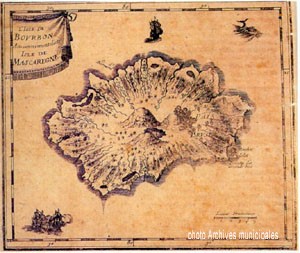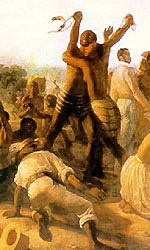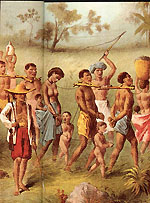a hot rock mantis production
a short history of Reunion Island
Ile de la Réunion
The original and most informative
English language guide to the island

The Past -
Paradise found and destroyed, hell on earth created
The island of Réunion has a history similar to that of Mauritius and was visited, but not settled, by early Malay, Arab and European mariners. The archipelago, comprised of Mauritius, Rodrigues and Réunion, was christened the Mascarenes by Portuguese navigator Pedro de Mascarenhas, following its European discovery in 1512. In 1642 the French settled the island when La Compagnie des Indes Orientales (the French East India Company) sent its ship, the St-Louis, and the King of France named it ile Bourbon. At the end of the seventeenth century, the population could be divided into white French landowners and African and Malagasy slaves.

There was no great rush to populate and develop the island and, from around 1685, Indian Ocean pirates began using Ile Bourbon as a trading base. Until 1715, the French East India Company was content to provide only for its own needs and those of passing ships, but then coffee was introduced, and between 1715 and 1730 it became the island's main cash crop and as a result the economy changed dramatically. The French enslaved Africans to do the intensive labour required for coffee cultivation. During this period, grains, spices and cotton were also brought in as cash crops.

Like Mauritius, Réunion came of age under the governorship of the remarkable Mahé de La Bourdonnais who served from 1735 to 1746. However, La Bourdonnais treated Mauritius as the favoured of the sibling islands and Réunion was left in a Cinderella role.
As a result of poor management and the rivalry between France and Britain during the 18th century, as well as the collapse of the French East India Company, the government of the island passed directly to the French crown in 1764. After the French Revolution, it came under the jurisdiction of the Colonial Assembly. In the late 18th century, there were a number of slave revolts and those who managed to escape made their way to the interior. They organised themselves into villages run by democratically elected chiefs and fought to preserve their independence from colonial authorities.
The coffee plantations were destroyed by cyclones very early in the 19th century, and in 1810, during the Napoleonic Wars, Bonaparte lost the island to the British. Five years later, under the Treaty of Paris, the spoil was returned to the French. The British, however, retained their grip on Rodrigues, Mauritius and the Seychelles. Under British rule, sugar cane was introduced to Réunion and quickly supplanted food production as the primary crop. During this period, the Desbassyns brothers rose to success as the island's foremost sugar barons. The vanilla industry, introduced in 1819, also grew rapidly. A great number of white settlers arrived too late to gain access to the land and, excluded from the plantation system, retreated to the highlands, where they constituted a poor white population ("Petits blancs" or "Yabs" ). The abolition of slavery in 1848 led white landowners to recruit indentured laborers for their plantations, particularly Tamils. Their conditions were often no better than the slaves that preceeded them. Most Tamils stayed at the end of their five-year contracts and continued to work for the white landowners. At the turn of the century, some Chinese and Muslim Gujaratis arrived on Reunion to sell food and textiles.
The golden age of trade and development in Réunion lasted until 1870, when competition from Cuba and the European sugar beet industry, combined with the opening of the Suez Canal, resulted in an economic slump. Shipping decreased, the sugar industry declined and land and capital were further concentrated in the hands of a small French elite.
|01.01.08 |The Present | The Future |
Women
A site dedicated to the role of women in the history of Réunion is a welcome breath of fresh air in the torrid climate of sweaty masculine paternalistic history - there who said I was objective?
Sources
Sources : Lonely Planet, Guide Routard, Acadamie de la Réunion, Every Culture - a good starting point on the sad history of slavery, click here (in French)
Market Place
Books and stuff



